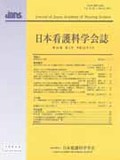Japanese
English
- 販売していません
- Abstract 文献概要
- 参考文献 Reference
要旨
目的:保健師が生活習慣病予防のための保健指導を対象者中心とするための技術を記述することを目的とする.
方法:保健師7名に対し行った半構成的インタビューの内容を分析し,生活習慣病予防のための対象者中心の保健指導を実践する保健師の技術を記述する質的記述的研究である.
結果:対象者中心の保健指導を実践する保健師の技術とは,『保健師が対象者の人生に沿った生活習慣改善の方法を共に創るための技術』であった.それは,[対象者のありのままの人生を受け入れる]技術が基盤となり,対象者の語りを引き出し,心を占めている思いを捉え受けとめていた.これによって[共に創る関係を築く]ことをしていた.それは人として思いを伝え合える関係であった.この関係の上で[生活習慣改善の方法を共に創る]ことが可能となっていた.本技術を用いることにより保健指導が対象者中心となり,主体的で継続できる生活習慣改善が可能となると考えられた.
Abstract
Purpose: This retrospective study describes public health nurses' competency in their practice of client-centered health guidance for lifestyle-related diseases prevention.
Methods: Data were collected using semi-structured interviews from 7 public health nurses and practice was assessed by qualitative analysis.
Results: Public health nurses co-create lifestyle changes for not only disease prevention but also the client's life. Three categories were identified from review of thematic interview data. The first category involved the theme of “Accepting the client to live his own life and find the direction to live as such.” The second category involved “relationship-building.” In order to better understand the client's life, public health nurses should create an atmosphere that encourages the client to broaden his/her perspective and elicits the appropriate narrative. Public health nurses can then utilize this to build a relationship which enables the free exchange of ideas. This relationship leads to the third category involving “co-creating optimal lifestyle interventions for disease prevention.” Our findings makes health guidance client-centered. In addition the client is proactive in changing continuously life-style for lifestyle-related diseases prevention.
Copyright © 2013, Japan Academy of Nursing Science. All rights reserved.


